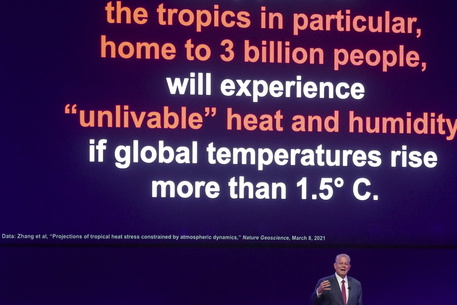(ANSA) - ROME, NOV 15 - At the UN Climate Change Conference
COP29, discussions on the global climate crisis intensified,
with sharp warnings on emissions and rising temperatures taking
centre stage. Calls for more climate funding are growing louder,
including from the European Union.
Ticking clock.
A coalition of leaders from industrialised nations and
climate-vulnerable countries called for more ambitious climate
funding on Wednesday at the United Nations Climate Change
Conference (COP29) in Baku, Azerbaijan.
The UN says 2024 is about to surpass the climate restriction of
temperatures not being 1.5 degrees Celsius hotter than the
pre-industrial average limit, although this does not amount to
an immediate breach of the target, which measures temperatures
over decades.
"The sound you hear is the ticking clock. We are in the final
countdown to limit global temperature rise to 1.5 degrees
Celsius. And time is not on our side. Unless emissions plummet
and adaptation soars, every economy will face far greater fury,"
said António Guterres, Secretary-General of the United Nations.
At the summit, the creation of a UN-backed global carbon market
has taken a step closer to reality with governments approving
new standards for the use of tradable credits to meet climate
targets, similar to the European Union's Emissions Trading
System (ETS). The agreement was hailed as a breakthrough after
nearly a decade of complex negotiations over the rules for
trading carbon credits.
However, world leaders offered competing visions on how to
tackle climate change and tough talks regarding climate funding
ensued.
Meanwhile, the conference was overshadowed by the re-election of
the Republican Donald Trump as president of the United States,
who had previously said he would cancel the US' commitments to
reduce carbon emissions. The former US president vowed to again
pull the country out of the Paris agreement once he is taking
over the presidency in January 2025.
Stark warnings on emissions.
Planet-warming carbon dioxide emissions from oil, gas and coal
rose to record highs this year, according to preliminary
research from an international network of scientists at the
Global Carbon Project - published just as leaders gathered in
Baku.
The research found that to meet the Paris agreement's ambitious
goal of limiting warming to 1.5 degrees Celsius, the world now
needs to reach net-zero CO2 emissions by the late 2030s -
instead of 2050.
Researchers said increases in CO2 emissions from India as well
as growth in international aviation drove emissions up, while
emissions decreased in the European Union and the United States.
This year is "virtually certain" to be the hottest in recorded
history with warming above 1.5 degrees Celsius, the EU's
Copernicus Climate Change Service said last week. It said the
world was passing a "new milestone" of temperature records that
should be a call to accelerate action at the UN negotiations to
cut planet-heating emissions.
The European Commissioner for Innovation, Research, Culture,
Education and Youth, Iliana Ivanova, reported that a six-fold
acceleration of the decarbonisation of economies is needed to
meet climate targets. She added that 35 percent of the funding
for the Horizon Europe initiative, which totals 93 billion Euro
over seven years, is earmarked for climate research.
Push for more climate funding.
A small group of developed countries that are currently
contributing to help poor nations adapt to climate change want
other rich countries and major polluters, including China and
the Gulf countries, to join them. According to 30-year-old UN
logic, China and the Gulf states are considered developing
countries - and are therefore recipients of climate aid.
As leaders spoke, negotiators released a fresh draft deal on
finance that includes a raft of options to raise funding - but
leaves unresolved sticking points that have long delayed an
agreement.
Most developing countries favour an annual commitment from
wealthy countries of at least 1.3 trillion Dollars. This figure
is more than ten times the 100 billion Dollars annually that a
small pool of developed countries - among them the US, the EU
and Japan - currently pay.
(continues).
(The content is based on news by agencies participating in the
enr, in this case AFP, ANSA, BTA, dpa, EFE, HINA, MIA, Ritzau,
STA, TASR and Tanjug). (ANSA).
COP29: Emission-cuts warning as leaders split on finance
Rising temperatures taking centre stage
